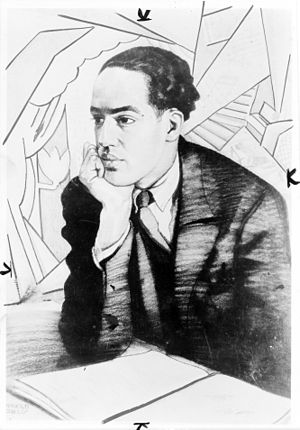 |
| Averno |
New Music Resource interviewed talented contemporary composer Elena Ruehr about her newest release Averno, her musical inspiration, and some practical insights for today's emerging artist.
This fall Avie Records released Averno, Elena Ruehr's album of music for chorus and orchestra featuring American poets: Emily Dickinson, Langston Hughes, and Louise Gluck. The recording features the Trinity Choir, Wall Street, Julian Wachner conducting, with Novus NY Orchestra. Soloists are Naumberg/Queen Elizabeth winner Stephen Salters and award winning soprano Marguerite Krull.
| Poet Langston Hughes |
NMR: Your latest album, Averno, was released by Avie Records and includes music combined with American poetry. Tell us more about this project's inspiration and production.
Ruehr: The project came about initially through a commission from the Jebediah Foundation and the interest of conductor Julian Wachner and Baritone Stephen Salters. Julian had commissioned a work from me in 1995 called Cricket, Spider, Bee, for chorus and chamber orchestra, based on poetry of Emily Dickinson. At that time, through Julian, I met baritone Stephen Salters, who sang the premiere of my work Gospel Cha Cha for baritone, chorus and orchestra in 2000 with Plymouth Music, Philip Brunnelle conducting, for a concert featuring Stephen singing African American poetry and music. Gospel Cha Cha is one of Langston Hughes' most important late works, a powerful work of human rights and history.
In 2007 Julian, Stephen and I envisioned a new cantata for chorus, orchestra and male and female soloists. I contacted Louise Gluck, a poet I admire a great deal. She suggested I use her as yet unpublished work Averno as a source.
Taking 11 poems from that book in order, my 40 minute cantata Averno focuses on the parts of Gluck's poetry that explores human's relationship to the natural world, both in the past and the present.
 |
| Composer Elena Ruehr |
It was a complex way to go, but less expensive and gave us a lot of control on the process.
NMR: Tell the NMR readers about your musical process and musical journey.
Ruehr: I started composing when my mother gave me piano lessons at age 4. She was a folk musician who could read music, but not a classical musician, and so when I started improvising melodies and short pieces at the piano she helped me write them down. By the time I reached junior high school it was clear that I needed a real composition teacher, and I started working with Melvin Kangas, who was music director of the local college and a graduate of the University of Michigan composition program. I wrote a few pieces for piano and flute in various combinations. I also wrote a number of pop songs and played in a band. Eventually, I decided that I was most interested in classical composition and went to the University of Michigan, then Juilliard, and have taught composition and music theory at MIT for 20 years.
"I am interested in making work that has a fluid sense of style and time period and place, but is held together through small musical ideas--melodic, harmonic, or rhythmic, often a combination of things, sometimes a motive."
I like the idea of working within a tradition and I enjoy enhancing classical performance practice with ideas from different cultures and styles. I am also very interested in melody and melodic composing. There is a small unjustified prejudice that melody is a simpler form of music, I disagree a great deal. Melody is the basis of my best work, and I use melodic line to structure my forms in ways that I think are fluid and natural.
BUY AVERNO by Elena Ruehr
NMR: What have been your greatest triumphs and challenges as a musician?
Ruehr: My greatest triumph has been, for me personally, recording the works I have written, especially for large forces. This has also been the greatest challenge!
NMR: Any practical advice for aspiring musicians today?
Ruehr: I think it is important to remember that a career in classical composition is usually a very very long build. A few people get a lot of notice when they are young, but in general, it takes a long time to build a career, a voice, a reputation....at least 20 years. So persevere and make sure you can support yourself financially through that kind of long build up. At the same time, it's important to compose every day. I think it is very easy to compose a little here and there and that's a sure way to just slip out of being an artist altogether. Also, I would say when you find players who are good and like your music, stick with them!
NMR: What does the future hold for Elena Ruehr?
Ruehr: I am writing a new work for the San Francisco Contemporary Chamber Music Players for 2014. It is part of a 10 composer commissioning project sponsored by the Jebediah Foundation, which has supported my work in the past. I am currently working on a new recording for violinist Irina Muresanu, which will also feature Sarah Bob, piano, and Jennifer Kloetzel, piano. I am hoping, someday, to record a CD of four concertos--I've only written one so far, a cello concerto for Jennifer Kloetzel.
Important Links:
AVERNO by Elena Ruehr
Official Composer Website
Listen to Elena Ruehr's Music








Comments